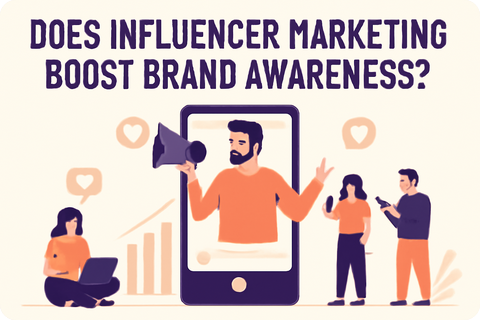Does Influencer Marketing Boost Brand Awareness?
Exploring the Power of Influencer Marketing to Increase Your Brand’s Visibility and Recognition

In today’s digital landscape, businesses are constantly seeking innovative ways to enhance their brand visibility and connect with their target audience. One of the most effective strategies that has emerged is influencer marketing. With the ability to engage audiences on a personal level, influencer marketing has proven to be a powerful tool for businesses looking to boost their brand awareness. In this article, we’ll explore how influencer marketing works, why it’s effective, and how it can help you build your brand’s presence online.
What is Influencer Marketing?
Influencer marketing is a strategy that involves partnering with individuals who have a significant following on social media or other digital platforms. These influencers, known for their ability to engage and resonate with their audience, promote brands, products, or services in a way that feels authentic and relatable.
Types of Influencers
Influencers come in various sizes and types, including:
-
Mega-influencers: Celebrities with millions of followers.
-
Macro-influencers: Individuals with a large following, typically between 100,000 and 1 million followers.
-
Micro-influencers: Influencers with a smaller, but highly engaged audience, usually under 100,000 followers.
-
Nano-influencers: People with a very small following, yet often exhibit an exceptionally high level of engagement.
Each type of influencer offers unique advantages depending on your goals and marketing budget.
How Does Influencer Marketing Boost Brand Awareness?
Influencer marketing helps businesses increase brand awareness by leveraging the trust and credibility influencers have built with their followers. Here’s how it works:
1. Expands Reach and Visibility
When a brand collaborates with an influencer, it gains access to a whole new audience. Influencers share content about the brand across their social media channels, amplifying its reach and visibility. This exposure is often more valuable than traditional advertising because the audience already trusts the influencer’s recommendations.
2. Builds Trust and Credibility
Influencers have built strong relationships with their followers, who see them as authentic and credible. When an influencer recommends a product or brand, it feels like a personal endorsement, which significantly enhances trust and brand perception.
3. Creates Engaging Content
Influencers are experts at creating content that resonates with their audience. By partnering with the right influencer, brands can tap into creative content that highlights their values, products, and services in an engaging and organic way. This type of content helps generate buzz and stimulates interest in the brand.
4. Increases Brand Resonance
Brand resonance occurs when a brand becomes deeply ingrained in the mind of a consumer. Influencer marketing, especially when executed well, can improve brand recall and lead to greater emotional connections between the audience and the brand.
Effective Influencer Marketing Strategies
To effectively boost brand awareness, businesses need to develop a well-thought-out influencer marketing strategy. Here are some key steps:
1. Align with Your Brand Values
It’s crucial that the influencer you choose aligns with your brand’s values, mission, and audience. Partnering with an influencer whose content and values resonate with your brand will ensure that the message feels authentic to their followers.
2. Define Your Marketing Goals
Before launching an influencer marketing campaign, establish clear objectives. Are you trying to increase brand visibility, drive traffic to your website, or encourage purchases? Having defined goals will help you choose the right influencers and measure the success of your campaigns.
3. Choose the Right Influencers
Selecting the right influencer is vital to the success of your marketing efforts. Look at factors such as engagement rate, audience demographics, and content relevance. A high number of followers is not always an indicator of success — it’s the level of engagement that truly matters.
4. Focus on Long-Term Partnerships
While one-off influencer campaigns can be effective, building long-term relationships with influencers can be even more beneficial. Long-term collaborations help maintain consistency and establish a deeper connection between the influencer, the brand, and their audience.
How to Measure the Impact of Influencer Marketing?
Measuring the effectiveness of influencer marketing campaigns is crucial for understanding their return on investment (ROI). Here are some key metrics to track:
1. Engagement Rate
Engagement rate is one of the most important metrics for measuring the success of an influencer campaign. It includes likes, comments, shares, and other forms of interaction with the influencer’s content. A high engagement rate indicates that the content is resonating well with the audience.
2. Brand Awareness Metrics
Metrics such as impressions, reach, and brand mentions are useful in evaluating the impact of influencer marketing on brand awareness. Tracking the increase in mentions across social media platforms can give you a clear picture of how well the campaign is boosting brand visibility.
3. Website Traffic and Conversions
Track how much traffic is being driven to your website as a result of influencer collaborations. If your goal is to generate sales, conversion tracking will help you determine whether the campaign is effectively influencing purchase decisions.
The Power of Influencer Marketing on Social Media
Social media platforms such as Instagram, YouTube, TikTok, and Twitter have become hotspots for influencer marketing. Influencers have the ability to create content that resonates with their audience on these platforms, leading to increased engagement and brand awareness. By utilizing these platforms, brands can tap into targeted demographics and generate high-quality content that boosts visibility.
Social Media Influencers and Their Impact
Social media influencers have a direct impact on consumer behavior. Studies show that many consumers are more likely to make a purchase based on an influencer’s recommendation than from traditional advertising. This is because influencer content often feels more personal, relatable, and trustworthy.
FAQs: Influencer Marketing and Brand Awareness
1. How does influencer marketing increase brand visibility?
Influencer marketing increases brand visibility by reaching the influencer’s established audience, allowing the brand to be exposed to a new, engaged group of potential customers.
2. How to measure the impact of influencer marketing?
You can measure the impact of influencer marketing by tracking key metrics like engagement rate, brand awareness, website traffic, and conversions. These metrics will help you assess the ROI of your campaigns.
3. Why is influencer marketing effective for brand awareness?
Influencer marketing is effective because it leverages the trust and credibility influencers have built with their audience. Their recommendations carry more weight than traditional advertisements, leading to greater brand visibility and engagement.
4. How can I partner with the right influencer?
To partner with the right influencer, ensure they align with your brand’s values, target audience, and marketing goals. Focus on engagement rates rather than just follower counts to find influencers whose audience truly resonates with your brand.
Conclusion
In today’s competitive digital landscape, influencer marketing has proven to be a highly effective strategy for boosting brand awareness. By selecting the right influencers, aligning with brand values, and crafting engaging campaigns, businesses can tap into the power of influencer marketing to expand their reach, build trust, and drive conversions. As the marketing world continues to evolve, influencer marketing remains a powerful tool for brands looking to increase visibility and engagement in an authentic and relatable way.



